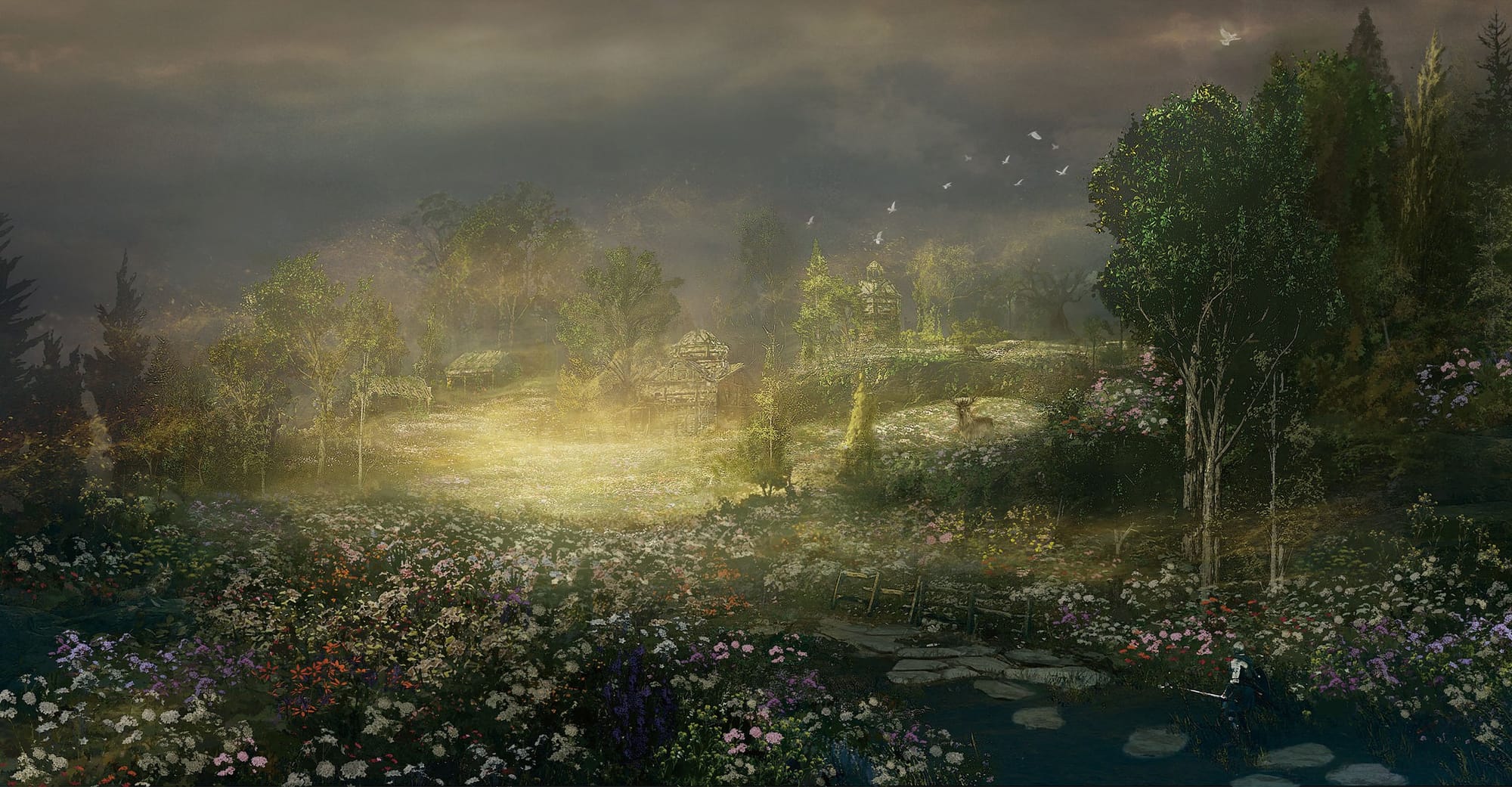A Deeply Subjective Look at Elden Ring: Shadow of the Erdtree
The power of a new emotional directness

Shaman Village is the most special location in all of Elden Ring to me. It’s located in the Hinterland, a serene meadow covered in blooming flowers. At the center of the village is a tiny Erdtree, which casts a gentle golden glow over its surroundings. I didn’t stumble onto the location by accident. I had seen some stunning gifsets on Tumblr and was immediately intrigued. While looking up how to reach this area, I had inadvertently learned the story behind it, and those revelations had already recontextualized large parts of the game. I thought I knew what I’d be getting, and had made my way to Shaman Village almost like a tourist would, just to see the grand spot with my own eyes. But it seems that knowing how to find the place and knowing why it’s so important was only a part of the experience.
The first sign is the change in the soundtrack, from the ominous foreboding drone heard through most of the DLC to a slower, melodic tune. Then my stomach felt like I skipped a stair on the way down when I realised this was a somber reprise of the main theme. It’s always deeply moving to me when a location with a painful past has become peaceful and serene in the present, whether in fiction or real life. There’s a deep undercurrent of sadness in places like these; they are a testament to time always moving forward. The loveliness of the blooming flowers and the golden glow of the little Erdtree are undercut by the somber music, the gut-wrenching words of the item descriptions and the feeling of desolation created by the sound of flapping birds’ wings in the best possible way. This was when I realised that Shadow of the Erdtree had what I’d been looking for from Elden Ring all along.
Last year, I wrote a piece called ‘What Is Elden Ring About?’, because I had become very well-acquainted with the minutiae of Elden Ring’s lore by that point, but felt that the game didn’t form a central theme the way From Software’s previous games did. The immense ambiguity around important characters’ motivations made it difficult to understand what any of it was supposed to mean. About the DLC I said this:
I used to think that there is some missing piece of the puzzle, something I was just not seeing that would tie the game up together. But it’s been months and either I’m oblivious or that easy answer just doesn’t exist. I am almost certain that upcoming DLC won’t fill in these pieces either.
I’m happy to say the DLC has provided me with that missing piece, even though it wasn't what I thought it'd be.
OK, enough waffling. Simply put, I think that Shadow Of The Erdtree is more emotionally direct than the base game. I think that instead of sacrificing that sense of ambiguity from the base game by being more obvious about the lore and themes, it has instead become more direct about the emotional weight of its narrative.

"There’s a deep undercurrent of sadness in places like these; they are a testament to time always moving forward."
I’m not sure how much of this is my personal interpretation of disparate elements of the game versus the intended emotional response the developers sought to elicit. All I can say is that there wasn’t a single moment in the base game that made me feel the way I did in Shaman Village, even though the base game had plenty of melancholy. This is why I spent all that time at the beginning of the piece describing Shaman Village. The game used its soundtrack, ambient sounds, and a lack of enemies to create a specific mood. It would not have been as special without any one of those elements. So, even though I’m not fully confident this isn’t just me projecting, I am equally sure this isn’t all in my head.
Shaman Village isn’t the only example of this new emotional directness. The main focus of this DLC is the demigod Miquella, who was an extremely enigmatic figure in the base game. I don’t think Shadow of the Erdtree really clears things up so much as it introduces knowns and unknowns in equal measure. We still don’t know a whole lot about Miquella, but we can be more specific about some of these unknowns than before if that makes any sense. Miquella’s quest for godhood and the contradiction at the heart of the ruthlessness in his actions to bring about a kinder world would have been compelling enough on their own, but the game also makes the emotional gravity of this clear with Miquella’s Crosses.
From a gameplay perspective, the Crosses are a very welcome sight, as they contain valuable power-ups, typically signal that there’s a checkpoint nearby, and also give me a little dopamine hit for filling out the map just a little bit more. They often contain text you can read by touching the crosses, and almost all of them read: ‘I abandon here a part of the flesh of my body’. I saw these enough times on each of the crosses I checked that I stopped giving it too much thought. Its purpose was clearly to show us how serious Miquella was about his pursuit of godhood, giving up his body for the cause just like Ranni in the base game.
And then I got to the Cerulean Coast, saw the Cross, touched the Site of Grace, went back to the Cross, and saw this: “I abandon here my doubt and vacillation”. It was a gut punch for me.
It’s contradictory, but the abandoning of physical flesh only emphasizes Miquella’s supernatural quality while ascribing the physical connotation of removal to concepts like doubt and hesitation. Suddenly Miquella feels very, very emotionally accessible. He is still exactly as mysterious and unknowable as before; it’s just that the game drew attention to the emotional aspect of all this. Miquella wasn’t some hardcore fanatic or an unknowable being with an unknowable way of thinking after all. Even demigods can feel uncertain, it seems. It was so easy to imagine Miquella standing where I stood, on that cliff, fields of blue behind him, the ghostly grey sea below, feeling uncertain up to the moment he didn’t anymore.
Of course, this is only the scene-setter for what follows deep underground in the Stone Coffin Fissure. This particular Cross didn’t catch me quite as off-guard; there had been a lot of build-up by this point. The idea that Miquella had had doubts this entire time already recontextualised his past actions for me and primed me to expect something significant going forward. A nearby phantom laments Miquella throwing away something he shouldn’t have. I was already feeling a sense of apprehension and sadness about what I suspected had happened, so seeing the words “I abandon here my love” was only the final confrontation. Still, taking that plunge down gave me time to reflect on just how sad it all is. It’s heart-wrenching to hear St. Trina implore you in a sincerely compassionate way to kill Miquella and forgive him.

"It’s heart-wrenching to hear St. Trina implore you in a sincerely compassionate way to kill Miquella and forgive him."
There are other moments of Shadow of the Erdtree’s emotional directness: Messmer The Impaler turns out to be more complex and more tragic than his title would suggest, and the little cutscene that ends the DLC is not just emotionally but also uncharacteristically narratively direct. Normally the player would have to work hard at imagining this kind of scene for themselves.
But with the clarity that time has given me, the two things I really, really remember from Shadow of the Erdtree are Shaman Village and the sequence at the Cerulean Coast and the Stone Temple Fissure, and they overshadow almost everything else in the game. They’re both instances of the very best of Fromsoft’s signature oblique storytelling, where the enigma surrounding the characters and narrative coexists with emotional accessibility. We will never know the whys, whens, and hows of Marika’s ascent to godhood, but we do have the gentle golden light of a small tree with nobody left to heal. Maybe we don’t need much more than that.
It’s not that I’m blind to the game’s flaws. My relationship with this game is cyclical; I adore it unquestioningly at first, aware of its flaws but not bothered by them in the slightest. Slowly I am bothered by them, by the frustrating lack of any kind of central idea, by the fact that most items I find are useless for my build, by the repetitiveness of the mini-dungeons. Gradually I begin losing my patience with the characteristically patience-trying gameplay, and finally, I experience one frustration too many and take a break from the game, typically for months. Eventually, my frustrations fade and I start thinking more and more fondly of this game until in my head it’s a masterpiece as long as you ignore its negligible faults.
This piece was immensely difficult to write. I started a rough outline for it in July, when I was still mostly head over heels in love with this game, with the frustrations slowly creeping in. By August, I gradually got more and more burned out until I put the game down and didn’t even think about it for months. During that time I would write and delete, write and delete; I simply didn’t know what I wanted to say.
I’m now back in the fond reminiscence part of the cycle, which is why I talk more about the parts of the game that made an impression, and it’s positive in tone because I’ve now forgotten everything I wanted to forget. It’s suddenly been easier to write again. It’s still a rambling mess, but Elden Ring is such a difficult game to write about that I’m not sure I could do any better than this. I’m not even sure I’ll agree with any of this when I inevitably pick up Elden Ring again sometime in the future (and then start getting sick of it). But I do think this is how I want to feel about this game, and on the whole, I think I’m right about this game’s emotional directness (even though there’s a worrying lack of the same thought on Reddit).
I do think that Shadow of the Erdtree was an improvement on the base game. Aside from the considerable gameplay improvements (a quality-over-quantity approach to mini-dungeons, a tightness in the world design, interesting enemy variability, bypassing the endgame levelling issue), there was an overall sharpness in the storytelling too. But what really makes it special is that it moved me with its story and characters on a deeper level than any of their previous games have in this way. We always speculate about the direction Fromsoftware will take their signature style next; I really hope their next game makes me feel this deeply too.
